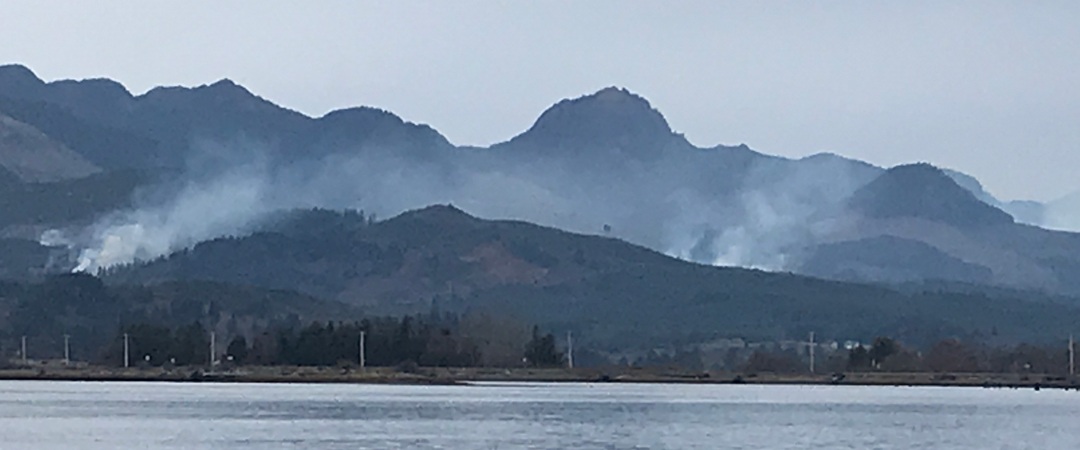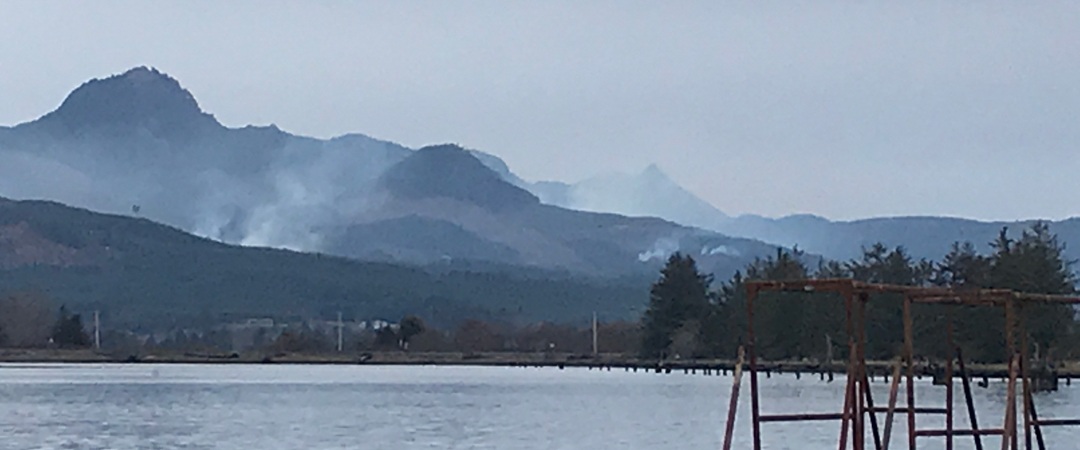Clearcut Smoke and What to Do
Many people who live on the North Coast have been concerned about smoky air caused by burning in clearcut areas, you may have even seen the smoke coming off our mountains. But what can you do about it?
What Causes Smoke after Clearcutting?
Usually, the smoke is caused either by slash burning or broadcast burning, both of which are typically done after clearcutting.
Slash burning uses chemicals to set fire to piles of woody debris left over after logging. Where broadcast burning is the burning of large areas with liquid chemical fire dispersed either by plane or backpack.
There are more environmentally friendly and healthier alternatives to burning, such as chipping the wood. But more often than not, timber companies burn.
This short video is a slash burning that took place on Oregon State University 0ld growth land in November of 2019. You can learn more by visiting the Friends of OSU Old Growth website.
Slash Burning
Because winds frequently come from the ocean and bounce off the hills, coastal communities are often exposed to this smoke. Obviously, this is a serious health concern.
Many agencies, elected officials and corporations haven't acknowledged that these fires can have serious health consequences to coastal residents.
One DEQ specialist even made the statement that "the smoke just blows out to sea." And, although this statement is technically true, there are a lot of people who live between the slash burning and the ocean.
What to Do When You See Smoke from Clearcutting
There's a number of things you can do when you notice smoke caused by clearcutting.
Contact the Oregon Department of Forestry
Call the Oregon Department of Forestry (503-842-2545) and register a complaint. You can also ask them for the names of the timber companies that own the land.
Determining whose land the smoke is coming from and publicly naming those timber companies is an excellent way to bring attention to this matter.
The decision to burn is made by the management of the timber companies that own the land, not the loggers. The logging contractors are simply following directions.
Report the Smoke/File a Complaint
It's important to report the smoke to DEQ. Each complaint DEQ receives is filed and kept on record, this enables the agency to track problems. Because these are "complaint-driven systems," the more people that complain, the more likely action will be taken.
Unfortunately, there currently are no DEQ Air Monitoring Devices on the North Oregon Coast, so the ONLY way DEQ will be aware of an air quality issue is if its reported.
You can find more information about our air quality monitoring program and air toxics monitoring by clicking these links.
What to Do:
Take a photo or video of the smoke violation, The State of Oregon has an online form and phone number on their website where you can file a complaint with the DEQ and upload your photo.
You can also notify Daniel Johnson, an Air Quality Monitoring Specialist, at the Oregon Department of Environmental Quality. Send Daniel your photos and video at: [email protected] or reach him by phone at 503-693-5713.
Photo Example
Write a Letter
Another way to get the word out about poor air quality caused by clearcut burning is to write to your elected officials and local newspapers.
Contact Oregon Public Broadcasting
Tony Schick, Oregon Public Broadcasting (OPB) is interested in receiving reports about clearcut burning. Tony is working on a year-long investigation of Oregon's forestry practices.
Here's a message from Tony
If you have an iPhone or other smartphone with voice memos, would you be willing to record yourselves describing what you’re seeing regarding smoke, smells, symptoms? As a radio reporter, that would be quite helpful to me. Also, if any others you know of are interested in contacting me to share their experiences (or, similarly, record themselves and what they’re experiencing), please encourage them to do so. Thanks!
Contact Tony at: [email protected], office, 503-293-1931 cell 503-329-7962
Contact The Oregonian
Rob Davis, an Investigative Reporter with The Oregonian, has been reporting on relationships between private industry, government officials, and money.
Rob has done extensive investigating on the timber industry and their practices. You can read his Polluted by Money series here.


